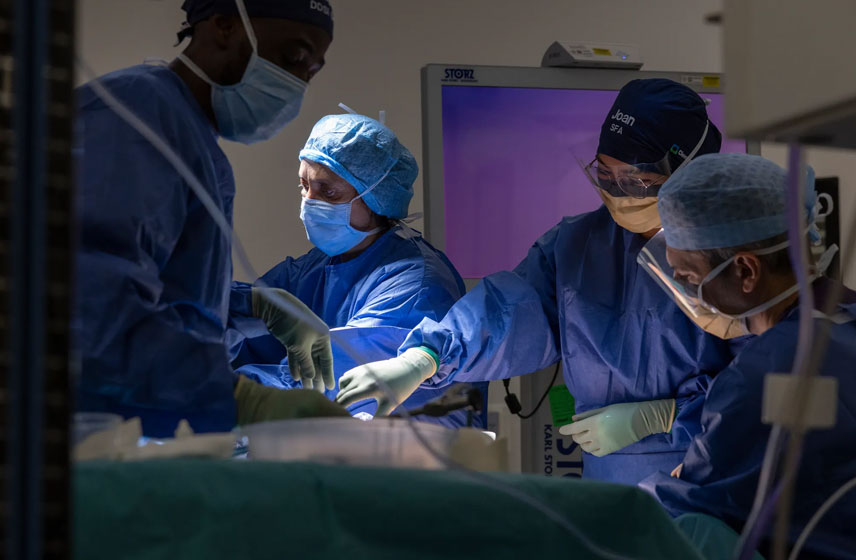
Bariatric Surgery
Considering weight loss surgery is an accomplishment in and of itself. This is a big decision, and we understand that. At Cleveland Clinic London, you’ll work with top bariatric surgeons and get highly personalised care in a warm and inviting setting. Our team is ready to listen, answer your questions and go over all options so you can move ahead to what’s next.
Why Choose Us for Bariatric Surgery?
Trusted experts:
Cleveland Clinic London is home to some of the U.K.’s leading private bariatric surgeons. As global leaders in the field, our team has extensive training and uses research-based treatments to help you reach your goals. Meet our team.
Skilled collaborative providers:
Our bariatric surgeons work with consultants from other specialties, including endocrinology, nutrition and psychology. This care team will tailor a dynamic treatment plan that can adjust to you and your needs at every step.
Comprehensive care:
We’ll ensure you receive the best private care and customised weight-loss plan. We offer all the latest treatment options, including sleeve gastrectomy, gastric bypass, gastric band surgery and revisional bariatric surgery.
Minimally invasive options:
We do laparoscopic surgery when possible. This approach uses smaller incisions for a shorter, more comfortable hospital stay, lower risk of complications and quicker return to daily activities.
Private Weight-Loss Evaluations at Cleveland Clinic London
Your weight loss journey starts with an evaluation. This visit allows our team to review your overall health and see if you’re a good candidate for bariatric surgery.
If you don’t live near London, we may be able to arrange a virtual consultation. International patients have access to complementary concierge assistance through Global Patient Services.
What to expect during your evaluation
For bariatric surgery to be successful, you’ll need to make lifelong changes. The way you think about food. How you eat. How you stay active. And we’ll coach you through each detail with careful consideration.
During your visit, your surgeon will review your body mass index (BMI). You may be a candidate for bariatric surgery if your BMI is:
- Over 40
- 35, and you have high blood pressure, high cholesterol, arthritis, breathing problems or other chronic conditions related to having obesity
- 30 to 35, along with unmanaged Type 2 diabetes
Your health and BMI aren’t the only deciding factors for surgery. Your evaluation will also include a consultation with a bariatric dietitian and psychologist. You may also meet with other consultants if you have chronic conditions, such as diabetes, obstructive sleep apnoea and heart disease.
Consultants Who Perform Bariatric Surgery
Locations
Our consultants see patients in modern and technologically advanced facilities in the heart of London.Private Weight Loss Surgery at Cleveland Clinic London
We offer several types of bariatric surgery, including:
Sleeve gastrectomy
A sleeve gastrectomy (gastric sleeve surgery) reduces your stomach by three-quarters, roughly from the size of a melon to a banana. This can help you lose up to 70% of your body weight. We may recommend this surgery if you have a BMI of 30 to 40.
Gastric bypass surgery
We may recommend gastric bypass surgery if you have diabetes, acid reflux or a BMI of 40 or more. Also known as Roux-en-Y, this laparoscopic procedure reduces your upper stomach into an egg-sized pouch. Your surgeon will then connect your stomach to your small bowel. This reduces how much you can eat and what your body absorbs, helping you lose up to 80% of your excess body weight.
Mini-gastric bypass surgery
Mini-gastric bypass may help if you have a high BMI or want to maximise your weight loss potential. This procedure moves food past a portion of your small bowel, which helps you lose more weight loss than with traditional gastric bypass. This procedure can have a higher risk of complications, such as abdominal pain, frequent bowel movements and worsened reflux symptoms.
Gastric band surgery
Your bariatric surgeon will place an adjustable silicone ring called a Lap-Band around the top of your stomach. They’ll then tighten it to create a pouch about the size of a mouthful of food. You’ll only be able to eat small portions while the band is in place. This reversible procedure can help you lose up to 50% of excess body weight. We may recommend this procedure together with weight loss injections.
Intragastric balloon
Under our team’s supervision, you will swallow a small capsule containing a deflated intragastric balloon. We’ll confirm proper placement by doing an X-ray before it inflates and takes up space in your stomach. This can make you feel full and help you establish a habit of eating smaller portions. It deflates and passes through your digestive system after roughly 16 weeks.
Revisional bariatric surgery
If you’ve had any type of bariatric surgery but are still gaining weight, your surgeon may recommend revisional bariatric surgery. We also use this surgery if you have any lingering side effects from bariatric surgery. These includes abdominal pain, acid reflux and vomiting.
What to expect from surgery and recovery
Weight loss surgery can take one to two hours and requires an overnight hospital stay, depending on the procedure. You may start your recovery, if needed, in our intensive care unit — one of the U.K.’s largest and most advanced. Our bariatric surgeons will be here to help you 24/7.
Private Bariatric Surgery Costs at Cleveland Clinic London
We offer highly personalised private care with convenient payment options. Have questions? Call on +44 20 3423 8900 to speak with one of our payment specialists.
What’s Next?
With prompt, convenient bookings and a team that’s always there to answer your questions, we help you feel comfortable and confident with what comes next. We’ll thoroughly explain each option and what you can expect. And when you’re ready, our team of private bariatric surgeons combines technical expertise with compassion to make sure our recommendations match your goals.
Contact us or call +44 20 3423 7500 for more information about bariatric surgery and weight loss.
Appointments
Ready to see us? We’re ready for you and look forward to the opportunity to assist with your needs. We’re available to take your call Monday through Friday, 7:30 a.m. to 8 p.m. and Saturday, 7:30 a.m. to 3 p.m. You’re also welcome to request an appointment online.
Self-Pay
We offer convenient self-pay services. But what does that mean? With this option, you’ll benefit from transparent pricing, access to unparalleled care, and the expertise of our consultants.
Private Insurance
Need help using your private insurance? We make it easy to get your referral, authorisation and make sure everything’s covered so you can come into your appointment with one less thing to worry about.
Patient Stories
-
Bariatric Surgery at Cleveland Clinic London Transforms Woman’s Life and Health
Read More“Bariatric surgery is not just about weight loss; it’s about improving health and quality of life. Sara’s journey shows how determination and the right support can lead to extraordinary outcomes.”

